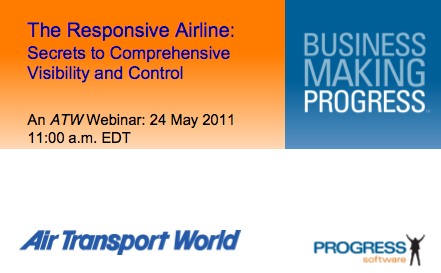Yesterday I listened into another webcast from Air Transport World entitled “Responsive Airlines: Secrets to Real-Time Visibility and Control.†The theme of this hour long discussion surrounded around how airlines can better manage internal systems & processes when a service disruption occurs, and the steps necessary to get back on track through enhanced technology all while minimizing the impact to the customer.

Everyone who’s flown knows a number of things have to go right for a smooth travel experience. From good weather, adequately maintained aircraft and functional air traffic control systems to fully staffed flights with rested crews that deliver your baggage quickly upon arrival, it can seem almost effortless when everything goes right. That’s what all the systems & processes at an airline are designed to do: get us from point A to point B with systemic precision.
On the other hand when one small change or other disruption occurs, that ideal travel experience can quickly erode into a nightmare for both the airline and traveling customer. A need exists then for airlines to better prepare & respond to real-time events as they occur, and have systems & processes in place to enable a smoother recovery from such events.
Here are some of the highlights from the presentations by David McEwan of IATA (the International Air Transport Association), and Joshua Norrid & David Olsen of Progress Software Corporation:
- Airlines need to ensure efficient & consistent irregular operations (IRROPS) procedures.
- Several ticketing & rebooking resolutions are in place, although compliance with these standards of practice varies. One example is when a passenger is rebooked onto another airline day-of-departure than that originally ticketed, the receiving airline should be called to confirm the space appearing in the global distribution system (GDS).
- The original carrier a passenger is ticketed on when a disruption occurs bears the responsibility to reissue the ticket (typically converting an e-ticket into a physical one) for processing by the new operating carrier.
- Approximately 95% of tickets today are electronic e-tickets.
- It can take up to two years for back-end processing & clearing of tickets when procedures aren’t followed as outlined. This means the revenue to/from the airlines in question can be in limbo for quite some time.
- The USA is unique in that our regulations don’t require the original fare basis code to be carried forward to the new carrier, whereas ex-USA carriers are required to match (via mapping) the re-accommodation into the proper bucket.
- Complexity in the industry is increasing, referring to service unbundling (ancillary products), regulatory mandates, mobile device availability and complex airline alliances & partnerships.
- Numerous systems (some rather antiquated) can bog down operational responsiveness to disruptions and newer technology overlays are needed to manage such events and the related transactions & processes as they happen in real time.
- One example of the above is the newer tarmac rule compliance requirement for aircraft sitting for extended periods of time going nowhere. It would be ideal for an overlay to exist that at say 45-minutes prior to needing to take an action, certain pre-defined processes are put into place to lessen the workload once the timeframe has been realized.
- Airlines tend to keep their own success stories in dealing with IRROPS processing close to their vest, not revealing successful strategies with the industry.
- Airlines need to better respond to passengers who’ve paid for a service upsell (e.g., buying Economy Plus seating on United) and then are unable to use that service when IRROPS occur.
The webcast went a bit deeper into each of the points above and provided a great perspective to what the airlines have to deal with during IRROPS that often passengers might take for granted. My intimate knowledge of the industry always keeps me level headed and understanding when I “suffer†disruptions to my own travel, and I’d recommend listening to the presentation and/or reviewing the slides found in this link.
This probably isn’t any consolation, however, to the numerous passengers impacted by weather in Dallas yesterday, and United is alerting that Chicago might see some disruptions due to storms today. Happy & safe flying everyone!

